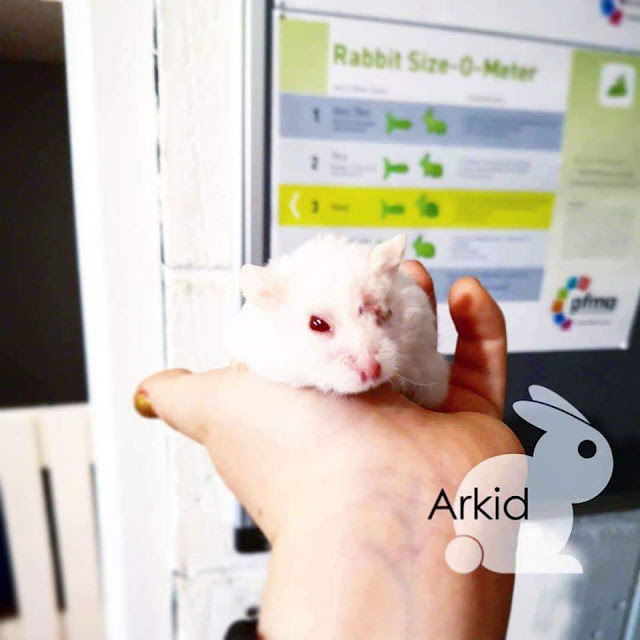Arkid - Full Write-Up
Some of our residents have particularly eventful and very engaging life stories that we simply have to share. Unfortunately, we don't currently have the time to write full write-ups for all of our residents in an in-depth blog post format.
Arkid had one rollercoaster of a life, and we'd love to dedicate this post to him.
Arkid had one rollercoaster of a life, and we'd love to dedicate this post to him.
Arrival:
Arkid was collected whilst cohabiting with another hybrid Russian dwarf hamster - Darkspark. Whenever we're collecting cohabiting animals, we always bring an additional carrier because of the countless times we've collected animals that were actually fighting, but their owner failed to mention it.
Not surprisingly, this was one of those times. It became immediately clear that the pair were fighting; they were separated immediately.
Both hamsters were happier to be away from each other. Darkspark still continues to live well.
We noticed that Arkid was blind, or had extremely poor vision very early on. This was likely a huge factor in his defensive behavioural issues. We managed to figure out ways to safely handle him and whilst ensuring it was as stress-free as possible - he never took to nail-trims, though.
We noticed that Arkid was blind, or had extremely poor vision very early on. This was likely a huge factor in his defensive behavioural issues. We managed to figure out ways to safely handle him and whilst ensuring it was as stress-free as possible - he never took to nail-trims, though.
Warning: Graphic and surgical content
Eye Complications:
Arkid developed unilateral proptosis: one-sided abnormal protrusion of the eye. The proptosis was unlikely to be caused by glaucoma as you'd typically see clouding of the eye also. The vet believed there was likely something behind the eye causing the protrusion.
When the eye was palpated, it appeared non-painful. We decided the best approach was to monitor his condition.
Not too long after, Arkid developed what appeared to be haemorrhaging within the eye. This time, his eye appeared painful so he was introduced to oral Metacam: a non-steroidal anti-inflammatory which can alleviate pain.
After seeking veterinary advice, we were advised to monitor Arkid for approximately 2-weeks in case the accumulation was naturally absorbed by the body. The accumulation within the affected eye wasn't absorbed, but he remained stable so surgery wasn't required.
Surgical Interventions:
One thing led to another, and Arkid developed both a neoplastic scent gland tumour (likely an adenoma) on his midventral sebaceous gland and an ocular melanoma. We knew Arkid would require all glandular tissue removed to prevent metastasis and reoccurrence as well as enucleation of his eye.
It was advised to do each procedure individually so he wasn't under general anaesthesia for too long - putting too much pressure on his organs.
SGT removal:
The tumour and all glandular tissue were removed. Arkid handled everything within his stride and seemed barely phased.
Once Arkid had fully healed from the procedure, he was booked in for eye enucleation.
Eye Enucleation:
Arkid's eye was successfully removed. Whilst in recovery, he pulled his stitches out which meant it was necessary to wrap his foot and trim his nails extra short (without damaging the hyponychium/quick) for the first 24hrs.
Luckily, that did the trick and Arkid healed beautifully.
Respiratory Issues:
Arkid developed an increased respiratory rate: an increased number of breaths per minute. The vet decided to introduce Arkid to oral Baytril/Enrofloxacin, Bisolvon/Bromhexine, and oral Metacam. We later introduced nebulized F10 antiseptic solution and isotonic saline (0.9% NaCl).
Arkid's symptoms remained the same, he was then weaned off Metacam (NSAID) onto oral Prednisolone (corticosteroid) - using steroids and non-steroidals can cause significant health issues.
Around the same time, Arkid developed what appeared to be an ocular melanoma in his remaining eye. Given increased GA risk due to respiratory issues, and the tumour wasn't causing secondary issues, surgery was discouraged.
Arkid's respiratory rate remained the same and he became increasingly dyspneic. Dyspnea describes shortness of breath, it can be acute or chronic - both ranging in severity. It can lead to serious secondary health issues.
We decided to introduce oral Ronaxan/Doxycycline and oral Terbutaline sulfate.
Unfortunately, Arkid continued to worsen.
Given the aggressive medicinal therapy failing to provide improvements, we feared there was increased evidence of neoplasia, pulmonary abscess, or lesions. All of which carried a grave prognosis. We all agreed humane euthanasia was kindest.
Arkid passed away peacefully on the 15th of February 2019.

















Comments
Post a Comment